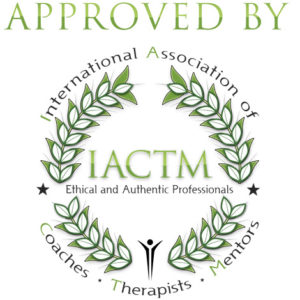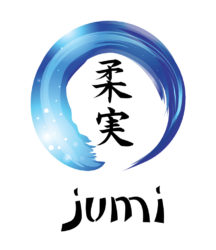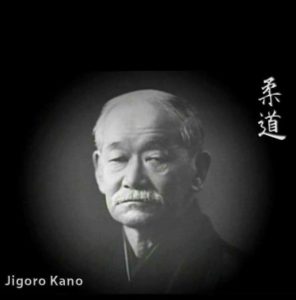 Jumi promotes open awareness and healing by engaging the body in energy flowing movements and conscious breathing.
Jumi promotes open awareness and healing by engaging the body in energy flowing movements and conscious breathing.
Jumi combines the principles of judo with mindfulness, thus the word jumi is an acronym for judo mind, however there is more to it…
Judo means the gentle way in Japanese. This martial art was founded by Professor Jigoro Kano, based on the principles of effective use of energy – maximum efficiency with minimum effort, as well as mutual welfare and benefit.
Similar to judo and aikido, jumi involves mental and physical training, emphasizing the ability to relax the mind and body even under the stress of dangerous or uncertain situations.
Jumi can be understood as the inner game of judo. The goal of jumi is to make the inner and broader benefits of judo useful to children and adults in all spheres of life.
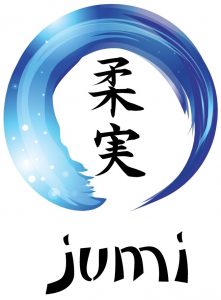
“Ju” 柔 in Japanese stands for adaptability, agility and maximum efficiency with minimal effort.
“Mi” 実 has several meanings in Japanese, including: essence, reality, truth, and good results.
Jumi 柔実 directly translated means pliability (adaptable to change).
In order to be successful in any pursuit, one must be adaptable to change. Practising jumi develops mindful adaptability, which in turn leads to openness, flexibility and efficiency –
– open to all aspects of your present reality
– flexible body & mind (perspective & attitude)
– efficient (spontaneous, purposeful, respectful) actions
Jumi sessions involve the following activities:
- Jumi sequences
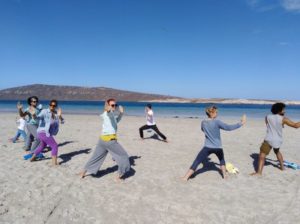
- Open Awareness training
- Authentic Self Empowerment
- Mindfulness based stress reduction
- Attention shifting & focusing
- Concentration techniques
- Conscious breathing skills
- Qigong related practice
- Yoga exercises
- Judo – playful
The core objective of jumi is to develop open awareness (embodied mindfulness) and the ability to maintain it in all contexts.
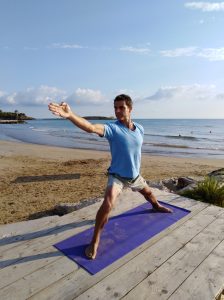 Open Awareness (OA) is a mindful mode of perception accompanied by a calm, receptive and resourceful state. Furthermore:
Open Awareness (OA) is a mindful mode of perception accompanied by a calm, receptive and resourceful state. Furthermore:
-
OA cultivates metacognitive introspective awareness – in which the mind can observe its own state and activities – an awareness of the mind itself.
-
OA enhances extrospective awareness – sensory perceptions and somatic experience.
-
OA reframes one’s current experience of self, placing phenomena within one’s awareness, as opposed to these being experienced separate from oneself. This reduces distress, enhances intuition and promotes a sense of interconnection.
In order to develop OA and have this state available in challenging situations, it needs to become embodied. Jumi has been created for the purpose of embodying open awareness.
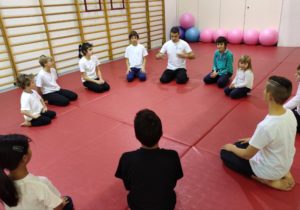 Embodied OA leads naturally to self-empowerment and a purposeful presence that is beneficial to those around you. This upholds Jigoro Kano’s principles of judo, transferring them from the dogo to the world.
Embodied OA leads naturally to self-empowerment and a purposeful presence that is beneficial to those around you. This upholds Jigoro Kano’s principles of judo, transferring them from the dogo to the world.
While jumi serves as a mind-body practice by itself, it can also be used to compliment other integral practices. There are jumi sequences suitable for young to old, at any level of fitness and psycho-spiritual development.
Introduction to jumi video.
Jumi for Healing, Personal Development and Performance Enhancement
Jumi has evolved quite rapidly over the past few years, as the practices have been adapted to various individual, pair and group needs. This has lead to refinements and new developments within the jumi approach, some of which are already being successfully applied by open awareness facilitators, and some are still being tested. I’ve been consistently surprised at how profound the different jumi practices can be for individuals, both young and old, as well as for pairs and groups, as outlined below.
For Individuals
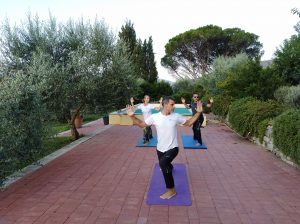 The majority of jumi practices can be done by oneself, at home or in nature. The practices typically involve gentle physical movements (resembling a combination of yoga and qigong) in the form of Jumi Sequences. Conscious breathing techniques are included to expand awareness and to cultivate vital energy, for example, the Jumi Tree Breathing Techniques.
The majority of jumi practices can be done by oneself, at home or in nature. The practices typically involve gentle physical movements (resembling a combination of yoga and qigong) in the form of Jumi Sequences. Conscious breathing techniques are included to expand awareness and to cultivate vital energy, for example, the Jumi Tree Breathing Techniques.
Through my own experience, including feedback from clients and students, we have found that jumi practice reduces stress and promotes the flow of healing energy while helping people to establish new (more whole and empowering) perspectives. Gaining meaningful insights, experiencing the release of tension and emotional blockages, and feeling significant ‘shifts’ in the body are relatively common.
Practicing jumi helps people achieve “yutori” (ゆとり), the Japanese concept of cultivating spaciousness in your mind and in your daily life. Yutori counteracts haste and stress, promoting peace and presence, helping you to find joy in stillness even during busy or difficult times.
- agility
- healing
- confidence
- mindfulness
- core strength
- concentration
- emotion regulation
- healthy self-esteem
- mind-body awareness
- performance enhancement
- energy balancing & grounding
.
Relationship improvement for pairs
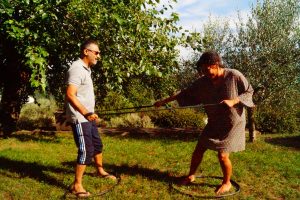 There are numerous ineractive jumi exercises that can be done in pairs. These are known to enhance awareness of the unconscious dynamics that influence the current state of our relationships – at home, at work and socially. Jumi practiced in pairs promotes the realisation of the different levels and qualities of connection that constitute our relationships. This, in turn, helps pairs to establish a deeper rapport, entailing empathy, compassion and open communication.
There are numerous ineractive jumi exercises that can be done in pairs. These are known to enhance awareness of the unconscious dynamics that influence the current state of our relationships – at home, at work and socially. Jumi practiced in pairs promotes the realisation of the different levels and qualities of connection that constitute our relationships. This, in turn, helps pairs to establish a deeper rapport, entailing empathy, compassion and open communication.
.
Performance enhancement for groups and teams
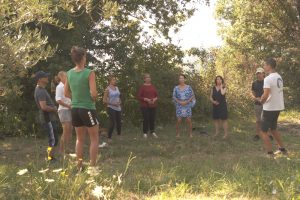 Jumi can also be practiced among groups and teams by means of interactive exercises and games. Group activities can reveal how each individual typically ‘shows up’ or ‘shys away’, whilst promoting inclusivity and integration in a fun, yet effective, way. In professional teams, these activities can help to improve team coherence and performance.
Jumi can also be practiced among groups and teams by means of interactive exercises and games. Group activities can reveal how each individual typically ‘shows up’ or ‘shys away’, whilst promoting inclusivity and integration in a fun, yet effective, way. In professional teams, these activities can help to improve team coherence and performance.
Read about jumi for enhancing sport performance.
.
Jumi For The World
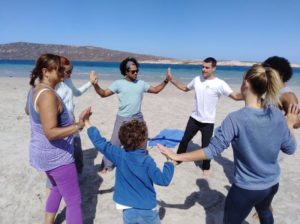 Since jumi doesn’t belong to any tradition, religion or culture; it is unbounded and available across the world. Practicing jumi helps individuals, pairs and groups to develop open awareness, which, among other benefits, promotes a deep sense of interconnection. When we feel deeply interconnected with each other and with everything in nature, we won’t be inclined to do each other any harm, nor will we destroy the environment.
Since jumi doesn’t belong to any tradition, religion or culture; it is unbounded and available across the world. Practicing jumi helps individuals, pairs and groups to develop open awareness, which, among other benefits, promotes a deep sense of interconnection. When we feel deeply interconnected with each other and with everything in nature, we won’t be inclined to do each other any harm, nor will we destroy the environment.
I believe that when open awareness becomes an embodied trait (with the help of jumi practices) in our personal lives, in our relationships, in our groups, and eventually, maybe, in societies around the world; we’ll start to see a world in which there is mutual respect, more harmony and equal possibilities for all to flourish. This is an ideal that I aspire to. For this reason, jumi is a calling for me, and therefore I am committed to making this burgeoning method of establishing open awareness widely known and practiced.
Jumi is a nonprofit initiative developed by Jevon Dangeli, (MSc Psychology, 40 years judo experience)
View our schedule to see dates and locations of all jumi sessions and events.
Contact us to arrange jumi sessions, or a jumi retreat, or a jumi camp for kids in your area.

